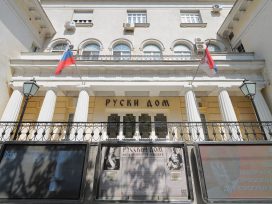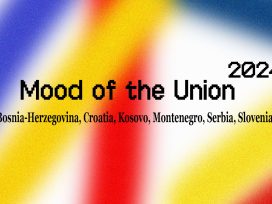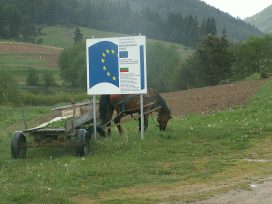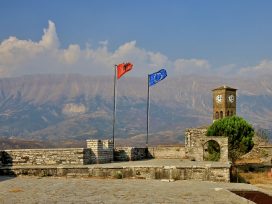After ten years of post-communist transition it is clear that different eastern European countries have moved into different directions. In more and more respects it makes no sense to compare Poland, Hungary or the Czech Republic with the Balkan countries or Russia.
When these countries started their post communist transition, all of them were focused on the idea of democracy and civil society as a way to fill the gap between the power and the people and of changing their centralized economy into a free market economy. In a very synthetic way this idea was expressed in Ralph Dahrendorf ‘s Letter to a Czechoslovak friend (1989). According to him, to change the legislation we (the ex-communist countries) needed six months; to see some important changes in the economy we needed six years, in order to build a civil society, i.e. to fill the gap between power and people we needed sixty years. This prediction proved to be very simplistic and in many respects not common for all the ex-communist countries. They have had quite different transition experiences. We can speak now of a sort of graduation, which is a sign of progress as well. Even in the Balkans there have been different experiences and histories during these ten years.
I will focus this article on the Balkans, more precisely on their most problematic part: former Yugoslavia and Albania.
Soon after the collapse of the communist regime in the countries of former Yugoslavia and in Albania, there appeared a question: can the democratic institutions be implemented and flourish on a ground created by a different culture and mentality from the Western one? To put it in other terms: these countries were opened towards a pluralistic system and free market. Both of them mean competition. Was it possible to keep this competition constructive or would it degenerate into conflict because of lack of the culture of competition and pluralistic values? Could these countries build democracy and civil society without crossing the bridge of an authoritarian state based on nationalism? In the economical aspect: Could these countries compete in the free market with something other than a black or gray economy?
What happened during the past ten years of transition was a sort of perversion of the democratic institution. In former Yugoslavia, after the collapse of communism, whose symbols were a way of keeping a collective identity, people fell into another sort of collective identity based on nationalism and religion. In Albania the competition between the new political parties degenerated into a conflict. Since Albania couldn’t compete with other products, as far as the economy is concerned, emigration and the black and gray economy replaced the socialist economy in the free market.
After ten years the results in this region are still very pessimistic: three and a half years after Dayton, after 50-60 billion US Dollars have been spent, it seems that people in Bosnia are preparing themselves for a future war. The new institutions don’t function, there prevails a tribal nationalism linked with economical interests. The reconstruction and the international presence have nourished a parallel economy that reinforces the already strong political Mafia power of various clans.
The problems remain almost the same in the entire region: The challenge is how to democratize and stabilize societies in which the dominating elements are tribal-nationalism, Mafia and “families” that have not experienced processes like state-building and nation-building. How to disarm societies where there exist many weapons and atavistic hatreds. How to liberalize economies that are in the largest part “black” or “gray” without increasing the Mafia power. Finally, how to Europeanize the different mono-ethnic states without advancing at the same time some forms of regional political integration.
The Conflict in Kosova and the Controversy of the War
After Bosnia, the Kosova crisis was the most tragic expression of that problem. In Kosova we could see again the failure to implement democratic institutions and civil society as well as the gap between West and East as far as these institutions and mentality are concerned, the triumph of authoritarian regimes and ethnic nationalism over democracy and civil society.
In Kosova there have simultaneously been two wars and three protagonists: the protagonists were the western world, the Serbs and the Albanians. The two wars were: a nationalist war between Serbs and Albanians and the war of the western world against the Serbs in the name of human rights and multi-ethnicity. Serbs and Albanians are in an anachronistic situation vis-a-vis modernity. The mainstream of their politics, based on ethnic nationalism, goes against the current western mainstream of peace over war, democracy over dictatorship, multi-ethnicity over ethnic nationalism and integration over separatism.
This non-conformity of times and spirits was evident even in the old medieval castle of Rambouillet during the failed negotiations of February 1999. The Albanian and Serb representatives remained in separate halls and it was necessary for the three negotiators – the American Hill, the Austrian Petrish and the Russian Majorski – to run back and forth from one team’s hall to the other in order to convince them to sign the agreement. The failure of Rambouillet was in essence an expression of the conflict between these two spirits of the time. The NATO bombardments in Kosova were the continuity by military means of what the West had tried to realize peacefully in Rambouillet.
The controversial situation remains. Albanians and Serbs are forced to live together at a time when they hate each other more than ever in their history. There is no sign that the Serbs feel guilty for the atrocities they committed towards the Albanians. On their side the Albanians appear less ready than ever to forgive the Serbs. Their stronger motivations remain the separation and the building of their nation-state. The West has to impose its civilization through its army. It is a new form of colonialism, a very problematic one, which will produce positive and negative consequences without avoiding, for a long time, the unpredictability of the future of the region.
Neo colonialism or wise/responsible presence?
It is clear that if the NATO troops retreat from the region, the ethnic hate will reproduce the ethnic cleansing in Serbia, Bosnia and Kosova, there will be increased internal troubles in Albania, while Macedonia will be under threat of disintegration. That is why everyone argues that the West must be present. This need for presence was dramatically expressed by Veton Surroi, one of the leaders of the Albanians who, speaking with NATO people after the war, appealed to them: “Don’t hesitate, be colonial!”
The question is, what kind of colonialism or protectorate should be installed in the region? The West has been criticized for having a great responsibility for what happened in the Balkans because they didn’t take the region seriously enough, that often the West was content with rhetoric about the great principles of democracy such as democratization, liberalization of the economy, and yet at the same time policy decisions were often very pragmatic and short term and ran counter to these very principles.
An example of this is Albania. Pragmatic Western policy has usually seen post-communist Albania in the context of the geopolitical concern for stability in the Balkans. The convenience of a partner who guaranteed stability was one of the main reasons why Western countries unreservedly supported Berisha and turned a blind eye to his construction of an authoritarian Mafia-state that collapsed in 1997 with dramatic consequences. In 1997, during the crisis of the collapse of the financial pyramids, it was time to remove Berisha from the political stage. Of the Western countries, the United States was closest to this idea, and announced several times that Berisha was the main cause of the instability. However, such a solution would probably not have immediately stemmed the exodus of the Albanians towards Italy that had brought Italian politics into crisis. This required a military mission. The Italians therefore argued that the Albanians could not do the job themselves because they were dying of hunger, as Italian Foreign Minister Lamberto Dini insisted. A few weeks after the arrival of the multinational military forces, Albania remained infested with Berisha’s gangs and bands of criminals, with its people still armed and demanding the resignation of a paranoid and incriminated president and with its police force paralyzed. To these armed forces, the presence of eight foreign armies was added, but 2000 deaths in three months could not be prevented.
Now, especially after Kosova, there is a stream of critics who translate the criticism towards the West into these terms: “We should be less timid and less respectful towards local powers. When it will become necessary we should be brutal because force and determination are the most appreciated virtues in the Balkan culture. Having the force and not using it when it is necessary causes only depreciation and sarcasm among them.” (Miles in the magazine Limes 4/1999)
One could not be more wrong than this type of colonialism. I prefer that instead of using the terms colonialism or neocolonialism, what these countries need is a wise, let us say responsible, presence.
What do I mean by a wise/responsible presence? First of all, an awareness of the complexities and problems of this presence; that there are several aspects that make a great difference between classic colonialism or neocolonialism and this preferred situation: These countries are in the process of nation-state formation, not in a pre-nationalist stage like the classic colonies were. The need of the Kosova Albanians to be de-colonized from the Serbs cannot work for long with the sheer replacement of the Serb police with the NATO police.
Generally the West has to keep in mind that Serb and Kosova nationalism is, as Vesna Pesic defined the Serb nationalism, a nationalism of rancor, a nationalism full of envy and hate towards the more powerful and more advanced, full of provincialism and inferiority complexes. Both strongly see themselves as victims of the West. Albanians do so since being split by the West after the Balkan wars of 1912; the Serbs because they were never allowed to create their nation-state and because, at the same time, they are less developed than the Europeans, but don’t want to admit it.
Another very problematic point of this neocolonialism is linked to one of the most fundamental organizational principles, that of the failure of authority and responsibility coinciding. Many problems can stem from this non-coincidence of authority and responsibility, as the recent history of the region has shown. The failure of UN forces in Bosnia is one of the most tragic ones. The entire history of Albania during these transitional years is another tragic example. Albania in one way or another has been a protectorate of the West, but a sort of protectorate where the protectors have not held responsibility.
Now the problem is whether the responsibility of the people in the region can be increased without their authority being increased in parallel. How can people be motivated and feel responsible when they don’t feel masters of their fate? This becomes even more complicated now in Kosova and Serbia when the motivations of the largest part of the population in these countries do not fit with the aims of the West, when those among the regional leaders who can easily gain authority are the nationalist ones. Look at this news from Prishtina:
PRISTINA, Yugoslavia – Monday, Oct. 4, 1999
In a rare public blast, NATO denounced comments by Hashim Thaci, political leader of the disbanded Kosovo Liberation Army and head of a KLA-backed provisional administration, saying he has “no connection with or influence over” the Kosovo Protection Corps.
Many ethnic Albanians see the group as the forerunner of an army to defend the province against the Serbs. The criticism by Maj. Roland Lavoie laid bare differences between the two sides on the role of the Kosovo Protection Force.
In a further example of this, Thaci openly contradicted the chief U.N. administrator, Bernard Kouchner, in a joint visit to the western city of Pec on Monday, aimed at building confidence among Bosnian Muslim residents in the city, following a spate of ethnic attacks on them.
Speaking to a crowd of about 500 people, Kouchner said “we are here to move together with you towards free democratic-controlled elections that will gain a wide autonomy for Kosova, where all of you will live and take part in the administration.”
Thaci, however, responded by stating he believes that international officials will recognize the right of the free will of the people in Kosovo, who will vote for independence in a referendum.
During a news conference, Lavoie also took issue with remarks made Sunday by Thaci in the U.S.-controlled city of Gnjilane, where he told a crowd that the Kosovo Protection Corps would have the same command structure as the old KLA and would soon be running its own academy to train officers for the defense of the province.
Calling Thaci’s remarks “factually incorrect” if not “inflammatory,” Lavoie said the corps “will not have a military academy of any description,” although he said it would have training centers for disaster relief and leadership skills.
By Robert H. Reid
Associated Press Writer
It is clear that Koushner cannot be a real authority among the Albanians with his speeches, while Thaci on the other hand is not allowed to be an authority although he (or people like him) are supposed to become the authorities among the Kosovo population. As far as responsibility is concerned these two missed authorities create a vacuum of responsibility by opposing each other.
Because of that sort of situation, it seems that the West has applied a politics based on fear and mistrust and imposed solutions. But fear and mistrust, let’s call it prudence, has not produced good results everywhere, nor have the imposed solutions. As I tried to explain, Albania is one of these examples. Another example that can produce bad results now in Kosovo is the UNMIK TV established in addition to RTV Kosovo and private media. Millions of dollars are being powered into it. The justification is the need for UNMIK to have institutional media to fulfil its important mission in Kosovo. But it seems that the Albanians have no eyes and ears for that kind of television. On the other hand, there is no justification for an “institutional” media in a democracy. It sets a very dangerous precedent. Any incoming government could use the same arguments about an exceptional situation and an important mission.
When the West arrived in the world of Albanian politics to give lessons in democracy, the first things the Western lecturers talked about were the meaning and benefits of democracy: Democracy means accepting risk. Democracy recognizes mistakes as part of human nature, and provides the opportunity to correct them through the ballot box. In spite of all the problems mentioned above this principle should not be forgotten. The authority, the responsibility and motivation can be increased when people are trusted and helped to grow up in the right direction not always treated like children.
This text is based on a paper presented at the conference “The responsibility: from principles to practice” organized by the Council of Europe in Delphes (Greece) from 14 to 18 of October 1999.






